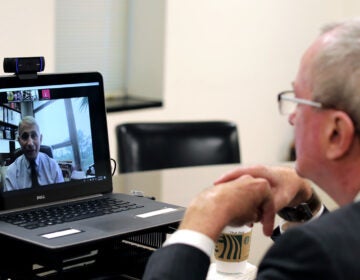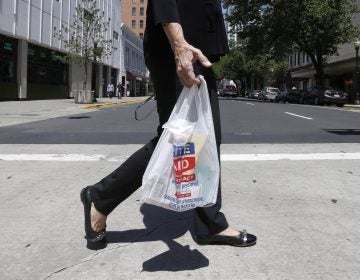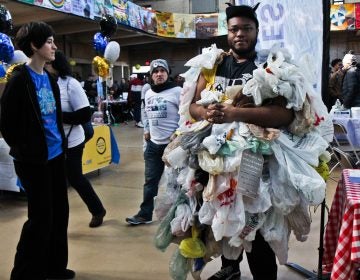N.J. legislature approves plastic bag ban, early prison release bill, state budget
The plastic bag ban might be the toughest in the nation. The budget includes tax hikes and $4.5 billion in borrowing.

The capital dome is seen at the New Jersey Statehouse. (Mel Evans/AP Photo)
It was a busy day in the New Jersey State House.
Lawmakers in both houses of the Legislature approved dozens of bills, which now head to Gov. Phil Murphy for his signature. Here are three major ones:
Plastic bag ban
Lawmakers in the Democrat-controlled state Senate and Assembly gave their final approval to legislation long in the making that will ban single-use plastic bags and polystyrene containers and limit single-use plastic straws.
The measure would also phase out single-use paper bags, which the bill’s backers say also contribute to pollution.
Democratic lawmakers lauded what would be perhaps the strictest plastics ban in the nation.
“There is about to be more plastic than fish in our oceans and waterways,” said Assemblyman John McKeon, D-Morris. “The time has long passed, or is long overdue, for us to move.”
The statewide ban came after dozens of towns had already adopted their own ordinances banning or restricting single-use plastics and polystyrene.
At least one Republican lawmaker argued that now was not the right time to pass a bill that could hurt businesses amid the ongoing coronavirus pandemic.
Early release for some prisoners
New Jersey has the highest rate of coronavirus deaths behind bars.
A proposal approved Thursday to release some people incarcerated in Garden State prisons early due to the COVID-19 pandemic is now heading to the governor’s desk.
“It is our responsibility in a prudent, thoughtful way to ensure that we don’t have any more blood on our hands,” said Assemblyman Raj Mukherji, D-Hudson. “If there are preventable deaths in the prison system because of the pandemic, they ought not occur on our watch.”
Under the plan, those who are within a year of their release could get out up to eight months early. They would earn so-called public health emergency credits for time served during the pandemic.
People incarcerated for violent crimes including murder and aggravated sexual assault, as well as repeat sex offenders, would not be eligible for early release.
Assemblyman Christopher P. DePhillips, R-Bergen, argued that no one convicted of a violent crime should be released because it would weaken the deterrent effect of incarceration.
Since the pandemic began, at least 48 people incarcerated in New Jersey prisons have died from the coronavirus.
The Murphy administration has moved to release some people during the pandemic, but families of those serving time say the efforts have moved far too slowly.
State budget
Both houses of the Legislature also signed off on a nine-month, $32.7 billion budget that will carry the state through the remainder of the fiscal year.
The budget backed by Gov. Murphy will raise taxes on millionaires and borrow $4.5 billion for what lawmakers have said is a spending plan geared toward recovering from the pandemic. It does not include some of Murphy’s other proposals, such as a new “baby bonds” initiative and a tax hike on cigarettes.
State Sen. Paul Sarlo, D-Bergen, said “revenue raisers” such as tax hikes and borrowing were necessary to pay for the state’s recovery from the COVID-19 pandemic.
“None of us should rejoice or be happy about having to vote on those difficult measures. But then again, this is not a normal budget, and these are not normal times,” Sarlo said.
Republicans and business groups have slammed the budget deal, saying the Murphy administration should have cut state spending instead of raising taxes and saddling residents with new debt that will take decades to pay back. It has also drawn criticism for including lawmakers’ pet projects.
“This budget demonstrates that the governor and this Legislature don’t give a damn about the plight of New Jersey’s beleaguered taxpayers,” said State Sen. Declan O’Scanlon, R-Monmouth.

Get daily updates from WHYY News!
WHYY is your source for fact-based, in-depth journalism and information. As a nonprofit organization, we rely on financial support from readers like you. Please give today.




